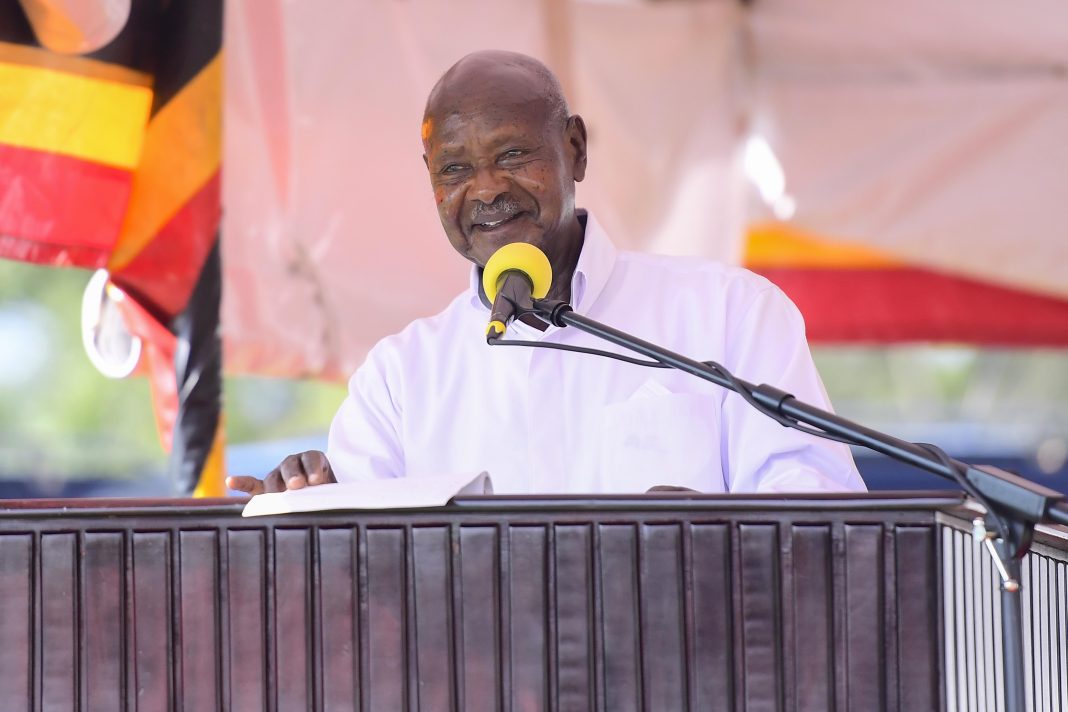
President Yoweri Kaguta Museveni is certain that the Presidential zonal industrial hubs for skilling the youth will assist Uganda in reducing its reliance on imported goods.
On Thursday 14th April 2023, shortly after commissioning the Madi sub-region’s Zonal Industrial Hub in Dazaipi, Adjumani district, the President noted that while training the youth, the industrial hubs should remember to put emphasis on addressing basic human needs such as food, shelter, and clothing, as these can turn into businesses for them to earn a living in the future.
He was relieved to find that the Adjumani Zonal industrial hub was doing the same.
“It’s critical that our children learn these skills because by wearing the shirts you’re wearing, you’re supporting foreign business.” You paid to support foreign enterprises, yet your children are impoverished. I want these youngsters to learn to make everything we use here so that we don’t waste our wealth, H.E Museveni said, adding that the things produced must have a market in Uganda, Africa, and beyond. He vowed to help the beneficiaries put their newfound knowledge into action.
“This industrial hub is Tabika (in Madi meaning to test in English or Endozo in Bantu dialect) and it is here to show you what can be done in modern society,” he added.
The President pushed the industrial hub’s managers to broaden the breadth of what they educate the youth, including how to create animal feeds from maize and other raw materials.
At the same event, the President, who is presently on a tour of investment and wealth creation in the West Nile sub-region with the subject “Securing your future through wealth creation and shared prosperity,” pledged to continue strengthening the region’s social and economic infrastructure. He vowed to work on the road from Laropi to Moyo, which would eventually link to Yumbe and Koboko. He also stated that the Laropi Bridge would be completed.
Concerning the erratic electricity, His Excellency the President stated that the government is working on a 400KV power line from Karuma to Oluyo in Oyam, as well as a 132KV line connecting Oluyo, Pakwach, Nebbi, and Moyo.
“Another strong line will be built from Oluyo in Nwoya district all the way to Nimule on the border with South Sudan.” “We will now tap the one for Adjumani district from that,” H.E Museveni stated.
On the matter of Apaa land disputes, the President stated that they will be resolved appropriately and urged the Madi community to be calm. He noted that just because the land is in Madi doesn’t mean the Acholis have to stay there, and the topic over illegitimate settlers in that area will be addressed as well.
He also warned individuals who were encroaching on Zoka woodland for human activities such as charcoal burning to stop immediately.
According to State House Comptroller Ms. Jane Barekye, the Adjumani Zonal Industrial Hub began operations in March of this year and is currently providing free training to 236 youngsters, 112 of whom are female, from Adjumani, Moyo, and Obongi, regardless of their level of schooling.
She stated that these include tailoring, hair styling, welding, carpentry and joinery, and building and construction. She also mentioned that they have begun teaching kids how to use the 4-acre model.
The State House Comptroller Ms. Jane Barekye informed the President that the training center is overseen by a committee chaired by the Moyo Resident District Commissioner and deputized by the LC5 Chairman of Adjumani and Obongi, the NRM Chairman of Moyo, as well as other youth and women.
“This was done to instill a sense of belonging, that this hub belongs to them, and that we always inform and consult them about whatever we plan to do.” “We also emphasize that we select instructors who are fluent in the local language,” Ms. Barekye added.
The ceremony was also attended and addressed by the Woman MP for Adjumani, Hon. Jessica Ababiku, the MP for Adjumani East, Hon. Mamawi James, and the Chairperson of the Training Center’s Management Committee, Gore Koffin.
President Museveni established the State House Zonal Industrial Hubs to reduce young unemployment by providing them with diverse hands-on skills.



